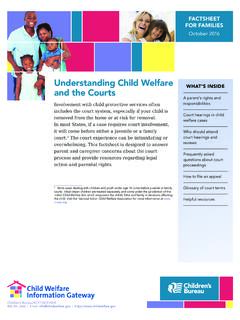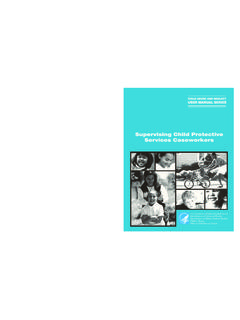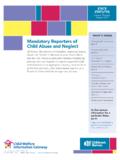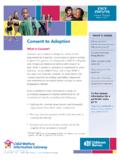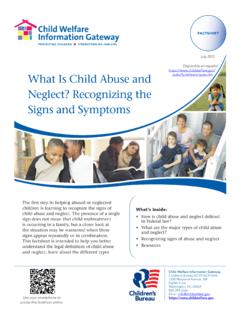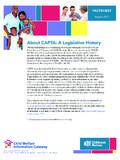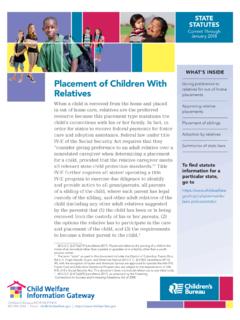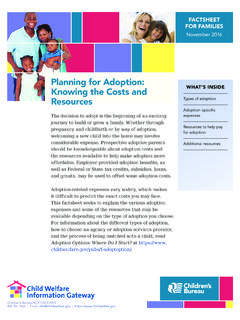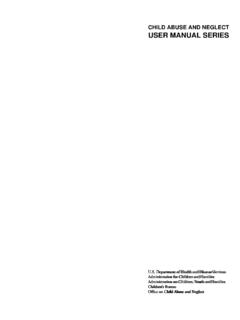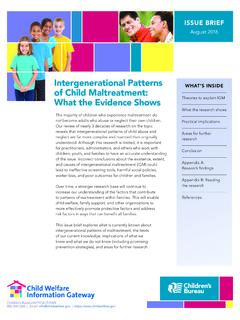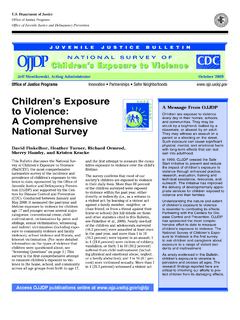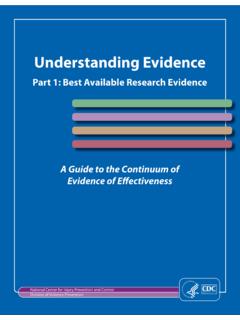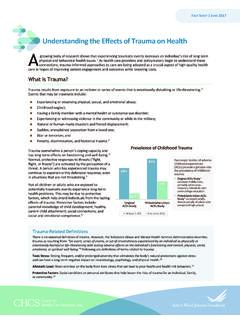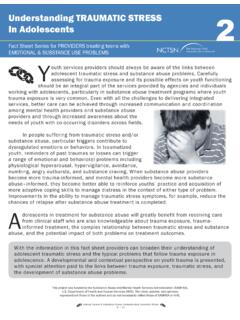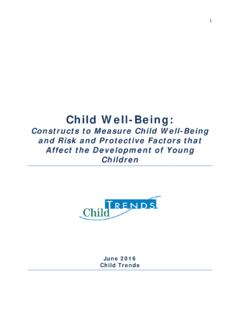Transcription of Parent Education to Strengthen Families and Prevent Child ...
1 Children s Bureau/ACYF/ | Email: | S INSIDEWhat is Parent Education ?What the research showsElements of effective programsEvidence-informed parenting programs State and local examplesConclusionResourcesReferencesPar ent Education reduces the risk of Child abuse and neglect by encouraging positive parenting practices that promote safety, well-being, and permanency for children and Families . The Child Abuse Prevention and Treatment Act (CAPTA), as reauthorized in 2010, identifies Parent Education as a core prevention service. Many of the Children s Bureau s Community-Based Child Abuse Prevention (CBCAP) grants fund Parent Education programming as part of local community prevention efforts. Successful Parent Education helps parents and caregivers acquire the skills needed to build healthy Families and issue brief provides an overview of Parent Education programming, research demonstrating its benefits, and information about different types and examples of evidence-based and evidence-informed Parent Education programs.
2 Innovative CBCAP-funded Parent Education programs also are highlighted. ISSUE BRIEFF ebruary 2019 Parent Education to Strengthen Families and Prevent Child Maltreatment2 What Is Parent Education ?While parenting may come naturally to some, others may need additional support and guidance to understand Child development, to respond appropriately to their Child s needs, and to cope with the challenges of parenting. Parent Education provides caregivers with knowledge, resources, and support to develop parenting skills to enhance Child and family well-being. It can also help parents or caregivers learn the tools and strategies to provide a positive and nurturing home environment where their children will thrive physically, emotionally, and cognitively.
3 Research has shown the enormous impact that positive parenting practices can have on a Child s social, emotional, and intellectual development, particularly during the early years (National Academies of Science, Engineering, and Medicine [NASEM], 2016). This includes a Child s enhanced sense of security, the ability to focus attention, and behavioral health. Parent Education programs are designed to help parents understand their children s individual needs and development, as well as their own roles and responsibilities, by offering tools and strategies aimed at maximizing positive outcomes for children and Families . Parent Education may emphasize the following (NASEM, 2016): Social learning theory. The focus is on encouraging positive behavior through building the Parent - Child connection.
4 Parents learn how to understand and respond to a Child s cues so they can be more attentive to his or her needs. The resulting improvements in Child behavior can in turn reinforce positive parental attitudes and lead to more successful parenting. Skills-based interventions and family system approaches that address trauma and other challenges. These can help to improve Child behavior, the Parent - Child relationship, and caregiver distress ( , interventions that teach parents how to improve safety at home or recognize and respond to symptoms of trauma). Training and consultation. These programs aim to help Families better understand children s emotions and needs, improve attachment between caregiver and Child , reduce problem behaviors in children, and enhance placement more information, see Child Welfare Information Gateway s webpage on Parent Education at What the Research ShowsChild welfare agencies are increasing their focus on evidence-based interventions to help improve parenting skills, sometimes using programs originally developed for non- Child welfare populations ( , the Incredible Years program) (NASEM, 2016).
5 Evidence-based interventions in Child welfare are those that are consistent with family and client values and backed up by research from clinical trials. The majority of research has explored the effects of parenting practices on children ages 4 8. There is less information on evidence-based interventions for caregivers of infants and very young children the most vulnerable group due to the long-term effects of early Child abuse and neglect. This is largely due to the limited availability of evidence-based interventions for this age group. The research base is building, however, as there are several programs relevant for infants and toddlers that are accumulating evidence and well-regarded programs for older children being adapted for the youngest age group (Barth & Liggett-Creel, 2014).
6 Most parenting interventions for infants and toddlers occur within the context of targeted home visiting programs for expectant and new parents deemed at risk for potential abuse or neglect. Home visits under the Maternal, Infant, and Early Childhood Home Visiting program ( ) allow States to expand and tailor evidence-based programs to their specific community Education to Strengthen Families and Prevent Child MaltreatmentThis material may be freely reproduced and distributed. However, when doing so, please credit Child Welfare Information Gateway. This publication is available online at 201ea9huyahytabrupasruy: material may be freely reproduced and distributed. However, when doing so, please credit Child Welfare Information Gateway.
7 This publication is available online at Education programs have shown significant benefits for parents, caregivers, children, and Families , such as the following (Wilder Research, 2016): More positive parenting style as a result of greater parental or caregiver understanding of Child development and effective communication styles Enhanced social connections as parents exchange ideas, provide and obtain support, and share resources Improved Child behavior, as children whose parents participate in these programs show greater prosocial behaviors and less negative externalizing behaviors Better quality Parent - Child interactions as a result of parents learning how to engage with their children Enhanced parental mental health and well-being, as improved skills and parenting knowledge help to reduce caregiver depression, anxiety, anger, guilt.
8 And stress Reduced risk of corporal punishment and Child abuse as parents learn alternatives to physical punishment and a new way of thinking about appropriate family roles and expectations of children Parental self-confidence and empowerment as caregiving skills progress and parents grow more competent and comfortable in their rolesTargeting Fathers Children whose fathers are involved with their upbringing demonstrate more positive outcomes than those with uninvolved fathers (Children & Family Research Partnership, 2016). Fatherhood programs have evolved over the past several decades from a focus on the importance of providing financial support to children to a greater emphasis on paternal parenting skills and healthy relationships.
9 Despite this shift, limited evidence exists on specific parenting interventions that are most effective with nonresident fathers and their impact on children and Families (NASEM, 2016). The Department of Health and Human Services Administration for Children and Families is funding studies on how fathers can build early attachment with their children. For information on existing research and a list of comprehensive resources, see the National Fatherhood Initiative at National Academies of Science, Engineering, and Medicine (NASEM) formed the Committee on Supporting Parents of Young Children in 2014 to assess current research and strategies for supporting parenting practice in the United States. The product of their work, Parenting Matters: Supporting Parents of Children Ages 0 8, reports on effective parenting practices, how best to support parents, and research needs.
10 The report highlighted the need for more research, particularly with regard to best practices for parents of children with special needs, father involvement, and diverse populations. It is available free online and for hard copy purchase at 201ea9huyahytabrupasruy: material may be freely reproduced and distributed. However, when doing so, please credit Child Welfare Information Gateway. This publication is available online at of Effective ProgramsCertain program characteristics and practices help make Parent Education programming successful. There is no one-size-fits-all approach. Programs need to fit community and cultural needs; have available staff and adequate resources; and, where possible, offer individualized interventions for the parents and children at risk of potential or repeated maltreatment .
